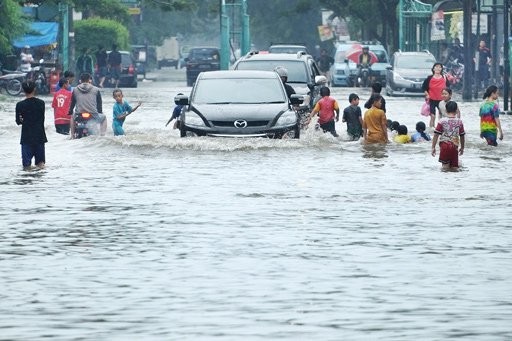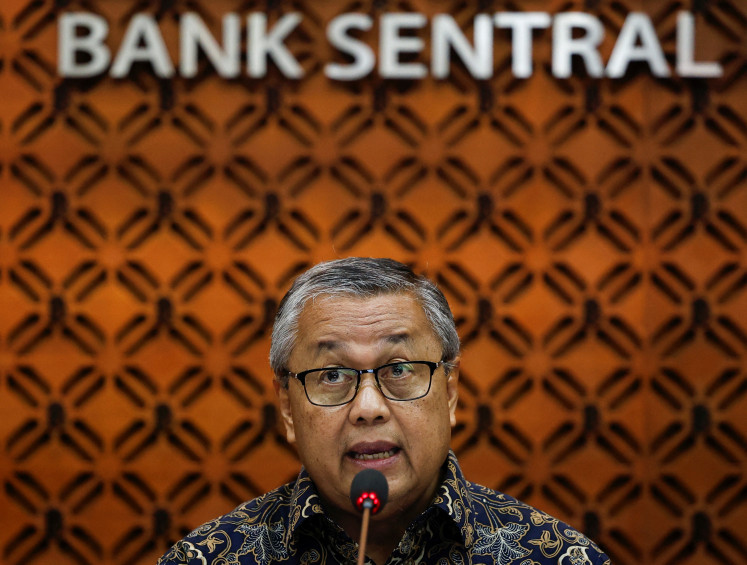Popular Reads
Top Results
Can't find what you're looking for?
View all search resultsPopular Reads
Top Results
Can't find what you're looking for?
View all search resultsMoving the capital won't prevent Jakarta from sinking say experts
Change text size
Gift Premium Articles
to Anyone
E
nvironmentalists have cast doubt over the recent statement from Jakarta Deputy Governor Ahmad Riza Patria that relocating the capital city to East Kalimantan will help prevent Jakarta from sinking.
The statement was made in response to director of city-owned tap water company PAM Jaya, Arief Nasrudin, who said that 90 percent of Jakarta would sink by 2050 due to over-extraction of groundwater.
The deputy governor had expressed his optimism that moving the capital city would reduce the population of Jakarta – currently home to almost 11 million people – and eventually lower excessive use of groundwater.
Director of Jakarta Forum for the Environment (Walhi Jakarta) Suci F. Tanjung said the capital relocation would not significantly lessen Jakarta’s population burden, especially considering the plan to make Jakarta the country's main business hub after it is no longer Indonesia's capital city.
"Riza's statement contradicted the government's current plan to make Jakarta a global business and economic hub. It means that Jakarta will keep growing and nothing will change unless authorities address the root of the problem," Suci told The Jakarta Post on Wednesday.
Jakarta is the most densely populated area in all of Indonesia. Each year, the headcount in the city and its surrounding areas grows by up to 250,000 people, and research suggests that Jakarta could become the most populous city in the world by 2030 with over 38 million residents.
Around 1.5 million civil servants, 10 percent of Jakarta's population, are expected to leave the city once the capital is relocated to East Kalimantan.
Heri Andreas, a geodesist of the Bandung Institute of Technology (ITB), also has doubts about whether moving the capital city will stop Jakarta's exponential population growth.
"If the Jakarta administration continues to develop the city [as a business hub], people will keep migrating in. I'm sure that instead of shrinking, Jakarta's population will keep on growing even after it is no longer Indonesia's capital," Heri said.
Water crisis
Jakarta is now sinking at a truly alarming rate – between 1.8 cm and 10.7 cm per year – and about 14 percent of the city's land area is already below sea level, according to Heri.
Unlike the water company’s prediction, Heri said that without aggressive effort around 40 percent of Jakarta's area will be submerged by 2050 – only slightly less frightening than the 90 percent loss.
Meanwhile, a recent study by the National Research and Innovation Agency (BRIN) has an even more optimistic projection, predicting that only around 25 percent of the capital area will be submerged in 2050.
The dramatic rate at which Jakarta is sinking is mainly due to excessive extraction of groundwater for use as drinking water, for bathing and other everyday purposes by city residents and large buildings, such as hotels, apartments and shopping malls.
This is partly due to the fact that piped water is not reliable or available in most areas so people have no choice but to resort to pumping water from the aquifers deep underground.
Currently, tap water services in Jakarta cover just 64 percent of Jakartans, supplying more than 20,000 liters per second to around 900,000 customers.
The continuous water uptake from ground wells has produced a massive empty space underground, which has become the major subsidence area.
In response to the land-subsidence issue, Jakarta Governor Anies Baswedan issued a regulation in October 2021 to ban groundwater extraction by high-rise buildings in parts of the city, effective by Aug. 1, 2023.
In 2009, the city also significantly increased the groundwater tax to discourage excessive use of groundwater, but enforcement has been lax and violations are rampant.
Jakarta is currently aiming to expand its piped water services to cover 100 percent of the city by 2030.
In January, the central government signed a memorandum of understanding (MoU) with the Jakarta administration to accelerate the construction of drinking water systems (SPAM) that would expand the tap water service in the city.
Under the agreement, the Public Works and Housing Ministry will build three SPAM facilities, which will be located outside Jakarta, to provide additional water supplies to the capital city.
These include SPAM Jatiluhur 1 and SPAM Djuanda in West Java, as well as SPAM Karian in Banten. The Jatiluhur 1 and Karian SPAMs are currently under construction and are targeted to be operational by 2024. The SPAM Djuanda project, meanwhile, is currently in the preparation phase.
Not helping
Heri said that instead of easing Jakarta's water crisis, relocating the capital might potentially worsen the city's water-shortage problem.
"About 80 percent of Jakarta's clean water supply comes from neighboring West Java and Banten provinces. West Java already has a water-shortage problem and as it continues to develop its industry and business sectors, water demand will only soar," he said.
"If Jakarta is no longer Indonesia's capital, West Java authorities will be reluctant to keep sending their water to Jakarta."
Although Jakarta has 13 rivers running through the city, the water is too polluted to be used for consumption.
Heri said Jakarta authorities could revitalize the city's rivers, harvest rainwater or desalinate seawater to increase its water supply. However, those procedures would make water in Jakarta very expensive.
Excessive groundwater extraction is not the only factor that is causing Jakarta to sink at an unprecedented level. It is also the result of construction on top of the city’s soft alluvial soil and rising sea levels from global warming.
Suci said that unless the Jakarta authorities stopped the construction of heavy, high-rise buildings throughout the city, land subsidence would continue to worsen.
"Studies have suggested that people not build buildings taller than two stories to prevent land subsidence. Research has also shown that land subsidence is worse in densely built-up areas in Jakarta, reaching 12-25 cm per year," she said.










